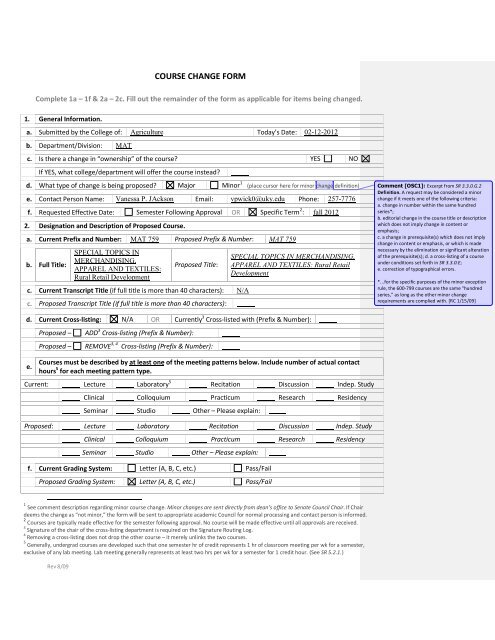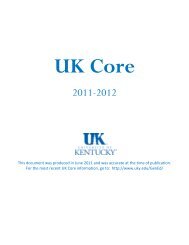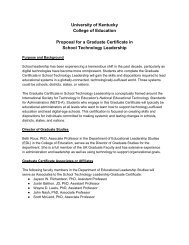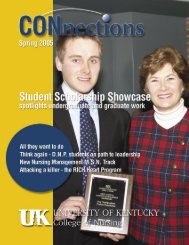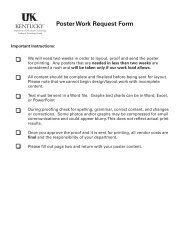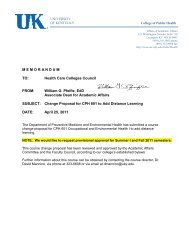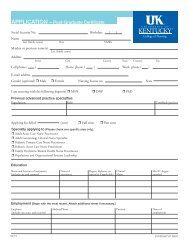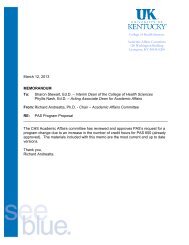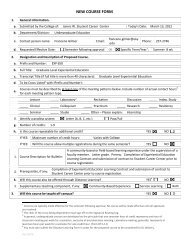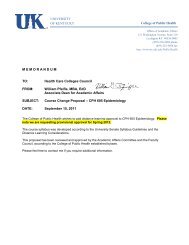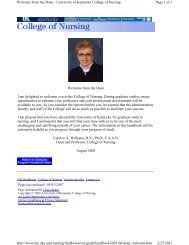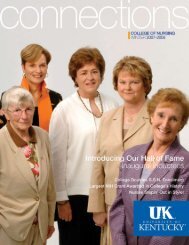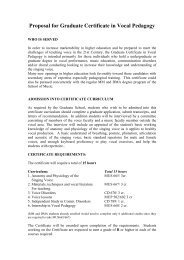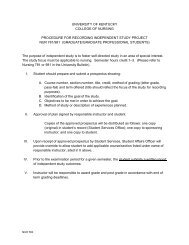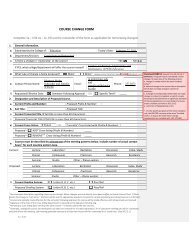MAT 759 - University of Kentucky
MAT 759 - University of Kentucky
MAT 759 - University of Kentucky
Create successful ePaper yourself
Turn your PDF publications into a flip-book with our unique Google optimized e-Paper software.
COURSE CHANGE FORMGeneral Information:Signature Routing LogCourse Prefix and Number: <strong>MAT</strong> <strong>759</strong>Proposal Contact Person Name:Vanessa P.JacksonPhone: 257-7776Email: vpwick0@uky.eduINSTRUCTIONS:Identify the groups or individuals reviewing the proposal; note the date <strong>of</strong> approval; <strong>of</strong>fer a contactperson for each entry; and obtain signature <strong>of</strong> person authorized to report approval.Internal College Approvals and Course Cross-listing Approvals:Reviewing Group Date Approved Contact Person (name/phone/email) Signature<strong>MAT</strong> Department 2-12-2012Kwaku Addo / 257-4917 /kaddo01@email.uky.eduGCC, COA 2-17-2012 Larry Grabau / 7-3469 / larry.grabau@uky.edu/ // // /External-to-College Approvals:Council Date Approved SignatureUndergraduate CouncilApproval <strong>of</strong>Revision 8Graduate CouncilHealth Care Colleges CouncilSenate Council Approval<strong>University</strong> Senate ApprovalComments:8 Councils use this space to indicate approval <strong>of</strong> revisions made subsequent to that council’s approval, if deemed necessary bythe revising council.Rev 8/09
RURAL RETAIL DEVELOPMENT<strong>MAT</strong> <strong>759</strong>: Special Topics in Merchandising Apparel & TextilesInstructor: Vanessa P. Jackson, Ph.D.Address: 315C Erikson HallE-mail: vpwick0@uky.edu (preferred)Telephone: (859) 257-7776Office Hours: By Appointment only; Reponse to e-mails within 24 hours.Technical Customer Service Center (http://www.uky.edu/UKITInformation on Distance Learning Library Services: (http://www.uky.edu/Libraries/DLLS)Library Services: Carla Cantagallodllservice@email.uky.eduTechnical Problems and Complaints: Technical support is available by phone at 859-218-HELP (4357) or Email them at helpdesk@uky.edu. The Technical Customer ServiceCenter can also be reached at (http://www.uky.edu/UKITTechnical Requirements: This course requires the student to have access to a computer that hasblackboard accessibility along with Micros<strong>of</strong>t <strong>of</strong>fice accessibility.Course Description: Characteristics <strong>of</strong> rural retail development; analysis <strong>of</strong> economic andrelated problems and potential for development.Required Readings: A collection <strong>of</strong> readings and handouts will also be used for readingmaterial for the class.Course Objectives:1. Increased students understanding and awareness <strong>of</strong> economic conditions for rural areasand communities in the United States and in <strong>Kentucky</strong>.2. Introduce students to rural retail development, concepts, trends, and changes in thecomposition <strong>of</strong> rural population and rural workforce.3. Introduce student to factors that influence firm location decisions as related to rural areasand communities.4. Provide students with practical experience with resilient and non-resilient ruralcommunities who have experienced changes in the retail environment.5. Develop student familiarity with computer based analytical techniques and s<strong>of</strong>tware.Course Outcomes:1. Assess and demonstrate an understanding <strong>of</strong> the economic conditions <strong>of</strong> the ruralcommunities in the United States and <strong>Kentucky</strong> through research methodology.2. Demonstrate an understanding <strong>of</strong> the rural retail development, concepts, trends,and changes in the composition <strong>of</strong> rural populations and rural workforce throughresearch methodology.3. Ability to formulate strategies for firm location decisions in rural communities.
4. The ability to construct an assessment <strong>of</strong> resilient and non-resilient retailcommunities who have experienced changes in the retail environment usingqualitative data.Course Policies:MAKE-UP <strong>of</strong> Work Policies:Assignments are due at noon on the due date. Your grade will drop by 10% for every day late. Ifyou are unable to complete an assignment, notify the instructor prior to the time due for theassignment. You may notify me via e-mail at vpwick0@uky.edu. NO makeup or timeextensions will be allowed unless this policy is followed and the excuse for not turning in theassignment is acceptable (according to UK policy). The following are university approvedexcuses: (1) serious illness (verifiable documentation must be submitted); (2) illness or death <strong>of</strong>family member (copy <strong>of</strong> obituary must be submitted); (3) <strong>University</strong>-related trips;(documentation required) and (4) major religious holidays (email me your requests).Scholastic dishonesty:Scholastic dishonesty is not tolerated. Forms <strong>of</strong> scholastic dishonesty include, but are notlimited to: plagiarism (copying or using someone else's work as your own – intellectual theft),utilization <strong>of</strong> unauthorized materials during academic evaluations, and giving or receivingunauthorized assistance during evaluations. Even evidence <strong>of</strong> inadvertent improper use <strong>of</strong>materials can result in a charge <strong>of</strong> academic dishonesty.Penalties for academic dishonesty vary depending on the severity <strong>of</strong> the <strong>of</strong>fense and anyprevious <strong>of</strong>fenses. The minimum penalty for a first <strong>of</strong>fense is a zero on the assignment inquestion and a final grade reduction <strong>of</strong> one letter grade. Serious or repeat <strong>of</strong>fenses will result inan E or XE grade for the course. For more information, see Part II, Section 6.3.0 <strong>of</strong> “The Code <strong>of</strong>Student Conduct” which can be viewed online athttp://www.uky.edu/StudentAffairs/Code/part2.html. You may also want to visit the AcademicOmbud’s website: http://www.uky.edu/Ombud. There you will find a paper “Plagiarism: What isit?” and an online tutorial entitled “How to avoid plagiarism.”More info on penalties. This is straight from the <strong>University</strong> Senate Rules (section 6.4.3):Penalties. If the student has previously received a penalty for an <strong>of</strong>fense at least as severe as anE or F in a course, the chair shall inform the responsible dean, who shall determine anappropriate penalty pursuant to Section 6.4.3.B.1.b.Otherwise, if the student has previously received a letter <strong>of</strong> warning, the instructor must assigna grade <strong>of</strong> E or F for the course. If the <strong>of</strong>fense is particularly egregious, and if the chair approves,
the instructor may also forward the case to the responsible dean with a recommendation for apenalty <strong>of</strong> XE or XF or a more severe penalty, pursuant to paragraph 6.4.3.B.1.a.Otherwise, if there are no prior <strong>of</strong>fenses or letters <strong>of</strong> warning in the student's record, theinstructor must award a grade <strong>of</strong> zero for the assignment on which the <strong>of</strong>fense occurred. Theinstructor may also choose to impose one <strong>of</strong> the following additional penalties after consultingwith the chair:(a)(b)(c)(d)require the student to perform extra academic work (failure tocomplete the extra work should result in a grade <strong>of</strong> E or F for thecourse);reduce the final grade in the course by a specified number <strong>of</strong> levels;assign a grade <strong>of</strong> E or F, as appropriate, for the course;Disabilities: “If you have a documented disability that requires academic accommodations inthis course, please make your request to the <strong>University</strong> Disability Resource Center. The Centerwill require current disability documentation. When accommodations are approved, the Centerwill provide me with a letter <strong>of</strong> Accommodation which details the recommendedaccommodations. Contact the Disability Resource Center, Jake Karnes, Director at (859)-257-2754 or jkarnes@email.uky.edu.”Course Requirements:PointsDiscussion Board Entries (10 @ 10 points) 100Readings & essay Questions (10 @ 25) 250Learning Activities (10@ 50) 500Store visits and completion <strong>of</strong> questionnaire (3@100)Final Report to retailers’50 pointsTotal points 1200Grading Scale90%-100% A80%-89% B70%-79% C69%-below ECourse Assignments:Discussion Board Entries: Discussion board questions are designed to evaluate yourunderstanding <strong>of</strong> the readings. The questions will relate to the topics discussed prior to date it isdue. To answer the question, you must have read the assigned readings. The question are postedin blackboard. Please answer the question as it directs you. The answer should be a minimum <strong>of</strong>500 words.
Essay Questions: Essay questions are developed based on the assigned readings. Read thearticles first and then attempt to answer the questions according to the readings. Essay questionsare to be turned as scheduled in the schedule <strong>of</strong> activities.Learning Activities: Learning Activities are designed to evaluate your understanding <strong>of</strong> thereadings. They are also designed to apply the readings to situations experienced by rural retailersand how you would handle the issue.Retail Visits & Learning Activities: (Individual manuals). This class requires students totravel to identified retailer in a small community that they can visit three times throughout thesemester. Students cannot miss these visits because the visits are used to complete necessaryassignments.Visit 1a. Identify a small retailer in a small community.b. Visit the retailer.c. Complete the Narrative on the communityd. Complete the Independent Retail Assessment PlanVisit 2a. Identify a small retailer in a small community.b. Visit the retailer.c. Complete the Narrative on the communityd. Complete the Independent Retail Assessment PlanVisit 3:a. Identify a small retailer in a small community.b. Visit the retailer.c. Complete the Narrative on the communityd. Complete the Independent Retail Assessment PlanSummary <strong>of</strong> findings
Schedule <strong>of</strong> Assignments, Activities & ReadingsDate Activity ReadingsUnit 1:Unit 1The rural LandscapeConcepts and Scope <strong>of</strong> Rural RetailingSustainable Rural Community Development in<strong>Kentucky</strong>Discussion Board 1Essay Questions 1Learning Activity 1Unit 2: Theory development in Rural RetailingUnit 2Resiliency and Non ResiliencyInstitutional TheoryTheories used in rural retailing developmentCommunity Development TheorySystems TheoryDecoupling & RecouplingDiscussion Board 2Essay Questions 2Learning Activity 2Unit 3: Business StrategyDiscussion Board 3Essay Questions 3Learning Activity 3Unit 4: Creating Resiliency and future Growth:Planning for future GrowthDiscussion Board 4Essay Questions 4Learning Activity 4Unit 5: Business Involvement in the communitySurvivalUnit 2Discussion Board 5Essay Questions 5Learning Activity 5Unit 6: Community Changes in Business SurvivalDiscussion Board 6Essay Questions 6Learning Activity 6Unit 7: Customer and Customer ValueLocal Economy & other external factorsDiscussion Board 7Essay Questions 7
Learning Activity 78. Leadership in the communityDiscussion Board 8Essay Questions 8Learning Activity 8Unit 9: Training Small Businesses ownersDiscussion Board 9Essay Questions 9Learning Activity 9Unit 10: Community Development: Involvement &ReciprocityDiscussion Board 10Essay Questions 10Learning Activity10Visit 1 to storeVisit 2 to storeVisit 3 to storeReferences:Keller, Suzaanne. 2003. Community: Pursuing the Dream, Living the Reality. Princeton:Princeton <strong>University</strong> Press. ISBN 0-691-09564-7 (paperback) Approx. $17.00Other readings, available on the web:Boyle, Mary-Ellen and Ira Silver.2003. “Poverty, Partners, and Privilege: EliteInstitutions and Community Empowerment.” City and Community 4: 233-254.Emery, M. and C. Flora. 2006. "Spiraling-Up: Mapping Community Transformation withCommunity Capitals Framework." Community Development: Journal <strong>of</strong> theCommunity Development Society 37: 19-35.Hillman, Mick. 2002. “Environmental Justice: A Crucial Link BetweenEnvironmentalism and Community Development?” Community DevelopmentJournal, 37: 349-360.Lichtenstein, Gregg A., Thomas S. Lyons, and Nailya Kutzhanova. 2004. “BuildingEntrepreneurial Communities: The Appropriate Role <strong>of</strong> Enterprise DevelopmentActivities.” Journal <strong>of</strong> the Community Development Society 35: 5-24.Williams, Colin C. 2005. “Cultivating Community Self-Help in Deprived UrbanNeighborhoods.” City and Community 4: 171-189.


